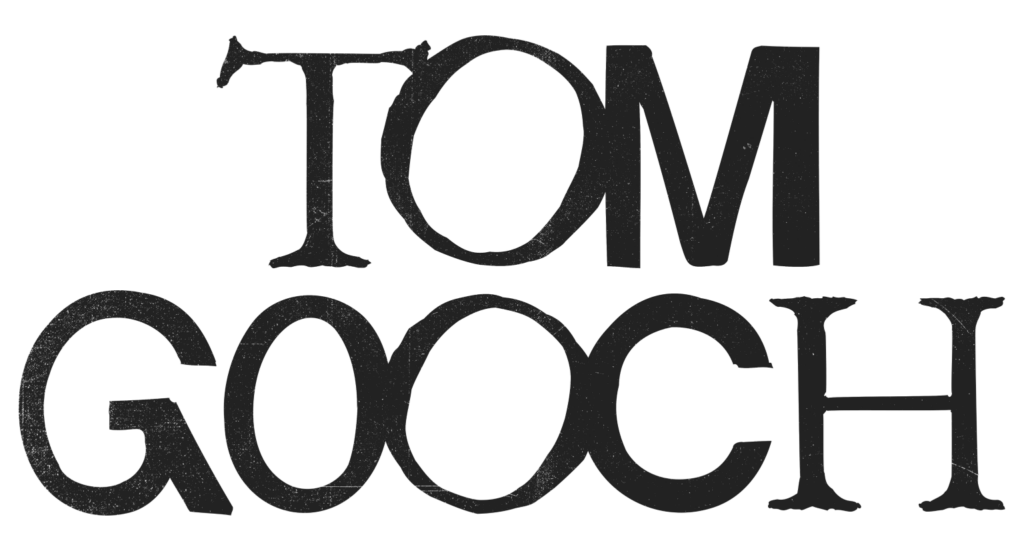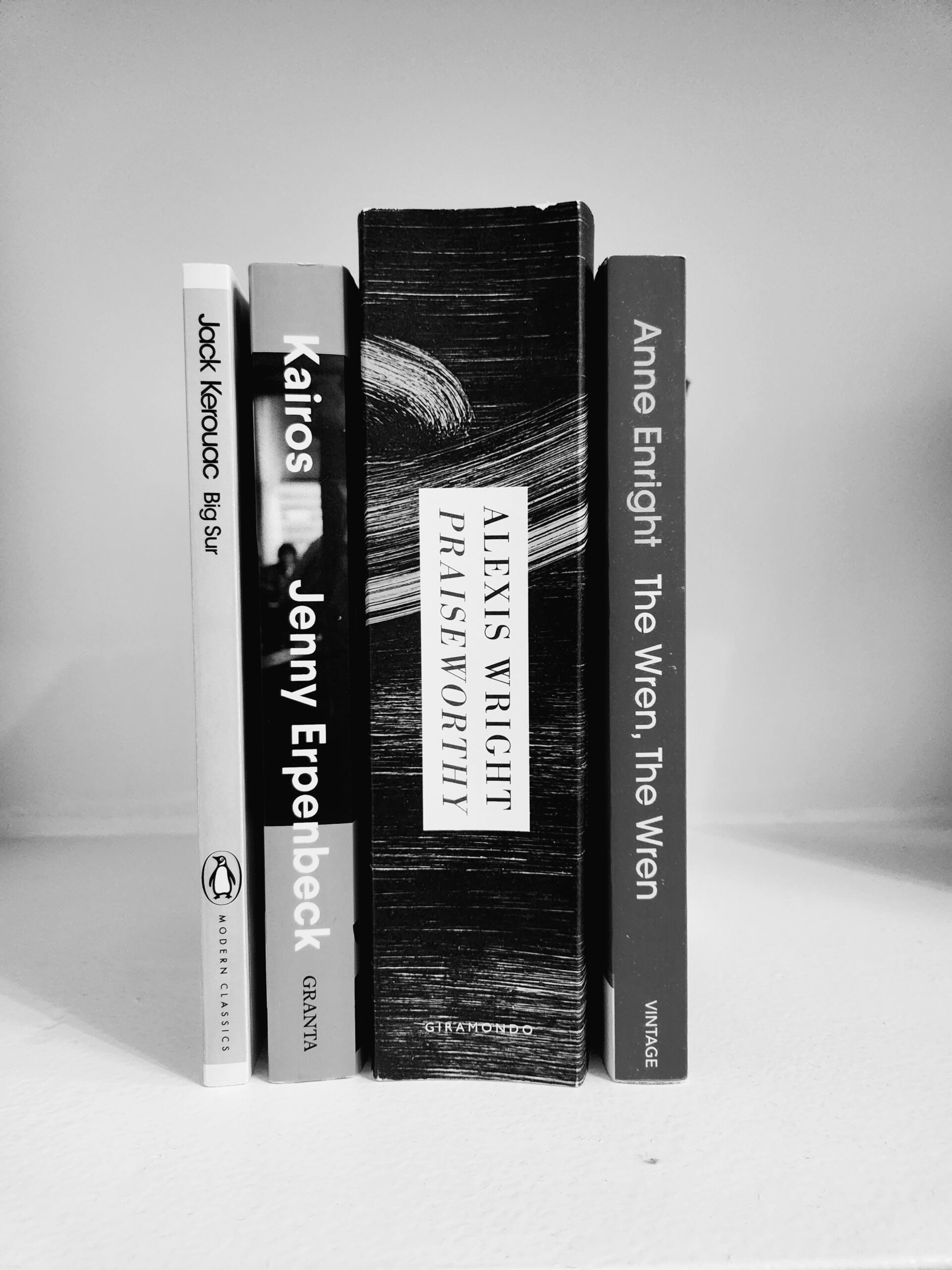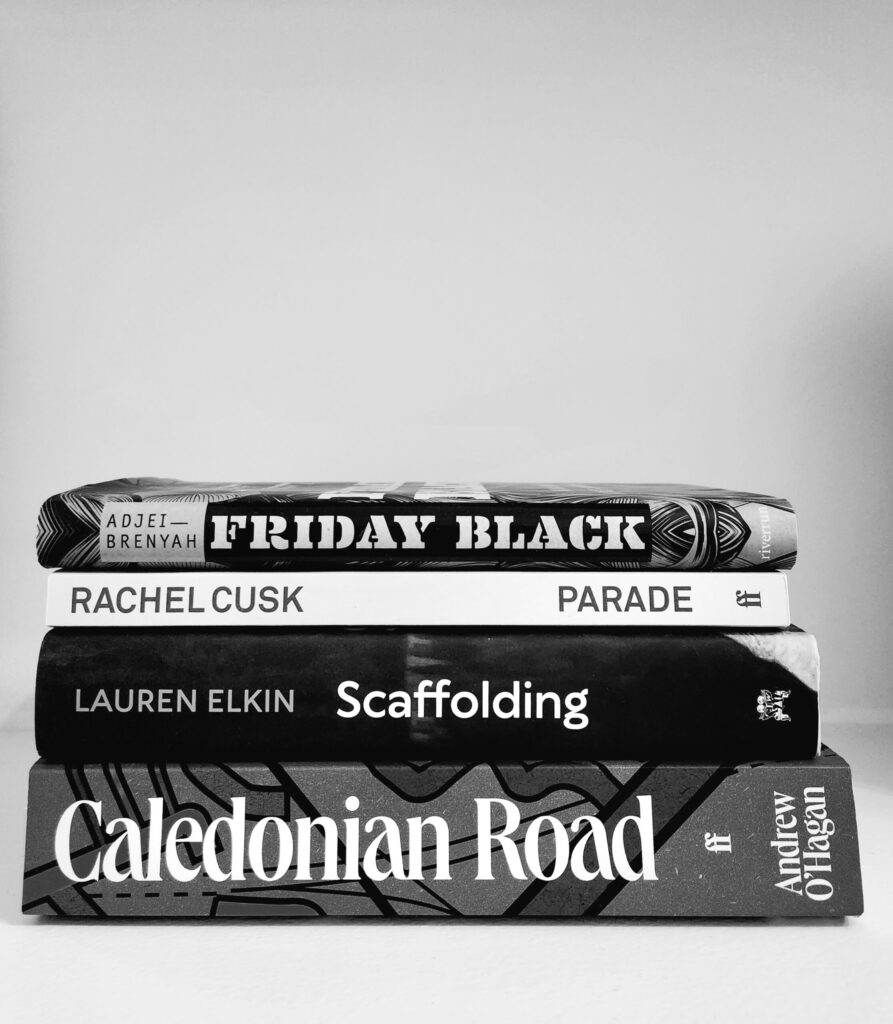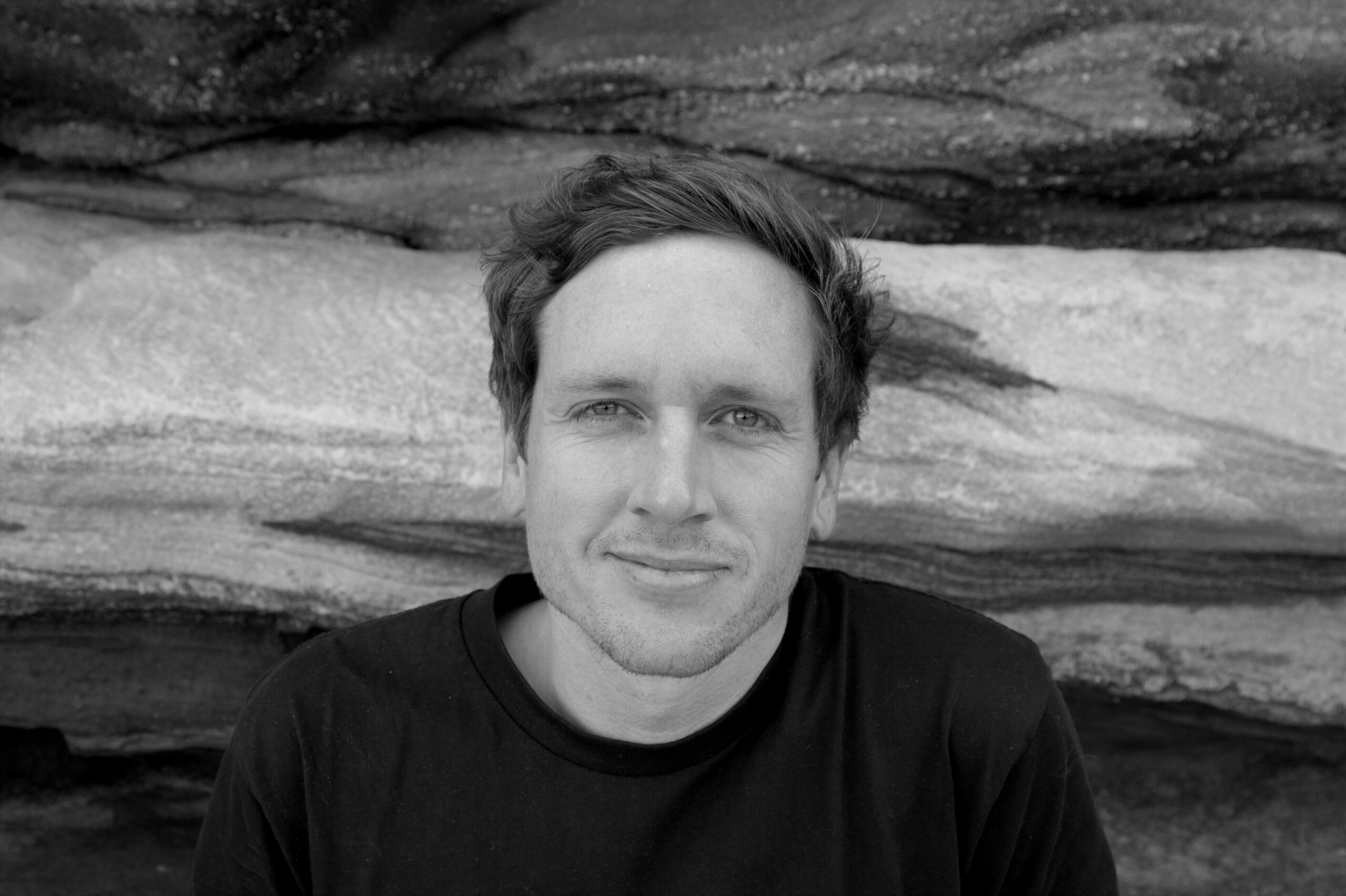Flanagan’s Wake
After five gins on the plane and a four hour drive from the airport on what resembled a mining access track (cruise control never activated, gravel dings along the doors, rental car bond lost), I emerge onto a narrow road that skirts a giant expanse of harbour under a low-hanging sky.
The town of Strahan seems to consist of three wide buildings set along this road, all with refurbished colonial shopfronts selling postcards and plastic souvenirs. The lone pub sells tourists forty dollar broiled-grey steaks. Behind this central business district is a scraggy hill thick with hostile, wiry bush. On the other side of the road, the harbour is reflected by the shiny glass and metal of the marina that houses two sleek, military-grade river boats. Somewhere in this marina Richard Flanagan is waiting for me.
Today we are going on a river cruise, and tomorrow, embarking on a five day hike along some godforsaken jungle track. All of this, our publisher tells us in her fake Oxford accent, will be documented in a short collection (each of us writing one chapter per day) to be released as part of Tourism Tasmania’s new year marketing blitzkrieg, to lubricate the critics ahead of Flanagan’s new release (a multi-generational history of West Coast miners told from the perspective of a wallaby), and to rehabilitate my public image after The Incident. I park in the public car park and put my sunglasses on and walk towards the marina. This is going to hurt.
I can see Flanagan from fifty metres away. He is standing next to the ramp leading into the bowels of one of the river boats, talking to an older man wearing a uniform. He is dressed like a primary school teacher on an excursion to the zoo. His shoulders are slouched slightly and his hands are deep in his pockets and he maintains eye contact with the other man. Continuous, unabated eye contact. One of his more annoying traits, I think as I cross the road without looking, hoping to initiate continuous, unabated contact with the front axle of a Land Cruiser. An interview I read on the plane described this trait of his as ‘a symptom of comfort, of being entirely at ease with his life and achievements’. Another gin.
I am now ten metres away and he says goodbye to the man in the uniform and turns and waves at me and flashes a wry grin and then shakes my hand and slaps me on the back so hard that I am slightly winded.
“Welcome to Strahan, how was the drive?” Flanagan asks.
“Beautiful. What an incredible place this is,” I reply.
We walk up the ramp together and in the black glass I see a reflection of myself and wonder whether the chasm between my thoughts and my words will ever close. We walk past a bar that is not yet open. Flanagan offers me the window seat, this being my first and last time in Strahan. If I can just get him talking about fish, then I might survive until the bar opens. I am tired from the drive and can’t think of anything charming or funny to say, so I look out at the vast, windless harbour and wave my arms in the direction of the grey satin sheet that mirrors the sky.
“So tell me Richard, where are the fish?” I ask.
He pauses, eyes flickering out the window to the harbour and then back to me.
He thinks: “Six days with this moron?”
He says: “Well, it all starts in the river. In fact it starts higher than that, in the lakes above the river that are cratered in the mountains, and even higher still, in the small creeks that run down into those lakes.”
If only writing a second novel were this easy.
*
We are on an island in the middle of the harbour, an island that was once reserved for the reprobates and the reoffenders, the failed escapees, the broken and corrupted souls, the banished. I feel at home. I think of The Incident and imagine all the critics and journalists taking turns to lash me as I bleed out on the rocks. I think about this place, an island at the end of the earth, and of what archaic and merciless machinations of power sent people to be imprisoned here, and I try to think of a good reason why Australia is still not a republic, and I try to think of anything except the way the swollen calves of the tour guide chafe against his hiking boots, and the sweat that is pouring down the sides of his shirt, and the fact that this man would have to be approaching one hundred and fifty kilos bone dry, and I think about the fact that I have not yet thought that this man’s ludicrous weight might not be his fault, and what that might say about my ability to empathise and my value structures, and then I try to stop thinking altogether.
Flanagan is bored, but he hides it well. He has been here countless times before and I sense there is not a single fact or folk tale the tour guide is regurgitating that he does not already know. The guide announces that the island was named after the wife of the merchant who paid for an early British voyage. I snort and the guide looks at me and there is a brief silence. We shuffle around the island looking at brick ruins. A shy sun emerges from behind clearing clouds and I look out at the surface of the water and there are patches that appear like shards of lilac-coloured glass where the wind lulls behind the island and other patches like corrugated iron only metres away, the same water roughed by an indifferent wind. Beyond the harbour I can see the mouth of a wide river and the creases in the land where ridges fold and run towards the horizon.
I read a sign that states that fifty five Aborigines were captured and brought here to suffer imprisonment, humiliation, pneumonia and rapid death. I wait for the guide to talk about this but he only mentions that a play is running in Strahan tonight and that there is a lamb special at the pub and then we are told to make our way back to the boat.
*
We are standing in the queue for the buffet lunch and the bar is still not open. The queue snakes down a long corridor and in the distance I can see three enormous plates of smoked salmon begin to thin out, and why the fuck isn’t the bar open yet? Speakers crackle above us and a woman speaks over the PA system, politely notifying us that we are cruising past a salmon farm. A series of large, floating ringed fences covered in black netting appear through the side window and the woman talks about antibiotics and feeding and how the seals will plunder holes in the netting like the tour guide is currently plundering the bacon bits from the potato salad. I suggest to Flanagan that it is quite remarkable to be eating an animal whilst motoring past its cousins. He turns to me and nods towards the salmon farm.
“It’s a fucking disgrace mate,” he says gravely.
An elderly woman in the queue turns around and glares at Flanagan. She does not recognise him.
“If you wanted gourmet, you should have stayed on the mainland,” she says.
The woman emphasises the word ‘gourmet’ as if to wound Flanagan, and then swiftly turns around again. Her work is done. My eyes widen in delight. Flanagan takes a deep breath as though winding up to explain and possibly retort and then he exhales slowly and continues shuffling down the line.
Flanagan skips past the smoked salmon tray to the smoking ruins of the potato salad. The salmon is a dark pink colour and looks wild enough. I take a small piece off the tray and place it next to my bread roll as the voice over the PA system continues to explain how the colour of the flesh can be augmented by carotenoids and that farmed salmon flesh is naturally white, and that by the way, the salmon that is served on the river boat today has been procured from the farm that we are currently passing. By now I am walking behind Flanagan down a small corridor on the way back to our seats. I pause, now in possession of a prohibited substance, snookered by ignorance and circumstance. I would have laughed at the timing and the salmon farms’ crass lobbying of public opinion via river boat, were it not for the fact that Flanagan recently authored a book on the topic (which I have not read), and the fact that the bar remains closed, and the fact that I am still in Strahan.
There is a tiny, artificial cough behind me and I realise that I have blocked the corridor and when I start to walk again an obvious solution comes to mind. I carefully balance the cutlery and the plate in my left hand and with my right hand I reach down and lift the glorious strip of deep, rich pink off my plate and up into the air, the strip itself poorly sliced and much longer than I had first thought, and then Flanagan begins to turn around and in the same moment I inhale in shock at the sight of his shoulders turning and my fingers twitch and the salmon plunges from its height down through my gaping mouth and into my airway. I choke and the walls seem to tilt and I think about Flanagan performing CPR on me (he would know it, of course he would), heaving pulses on my chest with his enormous hands and then I think of the look on his face as he pulls out the sliver of farmed salmon from my cold, blue lips. I can’t die like this.
Flanagan shouts in concern and then slaps my back, hard, for the second time today, and I feel the salmon dislodge and slide down the back of my throat. I didn’t even get to taste it.
“What was that?” Flanagan asks.
“I think it was my conscience,” I say.
We return to our seats and after a few minutes staring out at the monotonous blue water, I ask him what he is thinking of calling his first chapter.
“What do you mean, call it?” Flanagan asks.
“The brief said each chapter had to have its own title,” I say.
He offers a smile tinged with pity and sadness.
“I don’t take those things too seriously. They’re just guidelines aren’t they? I’m not taking dictation from someone in a suit in Sydney,” Flanagan says.
The sun feels slightly warmer through the glass and I feel shame rising like bile through my salmon-lined throat.
“Fair enough, I mean, I just thought we had to,” I mutter.
“I’ve been reading a lot about the different types of clouds recently. If it fits, I might work in something about that. Have you got a title?” Flanagan asks.
There is sudden movement at the bar. A uniformed woman is rushing around the small space behind the counter, looking frantically through drawers and behind rows of wine bottles. Loud voices echo from the bow and a teenage boy comes barrelling down the corridor and sprints up the stairs towards the navigation deck. The uniformed woman pulls down a bright red first aid kit from a high shelf behind the bar. A voice crackles over the PA system and explains that a passenger is ill and that we are to immediately return to the marina. I stand up to look over the seat in front of us and towards the end of the corridor and I see figures crowding around a set of legs that extend horizontally across the floor and swollen calves the colour of farmed salmon and ankles with severe chafe and the hiking boots of a man I had mocked but never known.
I think: “What about Death of a River Guide?”
I say nothing.
*
It is approaching midnight and we are sitting in the pub and I am very, very drunk. We have been at the same table by the window since the early afternoon, since we returned to the marina, since I called our publisher who insisted that we had to start the trek tomorrow and not today because the photographer would only arrive in the morning. Our per diems were all spent by three o’clock. We had recently been joined by a Flanagan acolyte, a middle aged, bespectacled man who called himself Sebastian (of course), who sat down next to Flanagan without asking and who claimed to edit a literary journal based in Hobart, though I could not find any evidence of this on the internet I was now browsing on my phone under the table.
Flanagan and I had reached an unspoken agreement where he would indulge Sebastian with conversation and I would buy the drinks. In the past hour, Sebastian had traversed much of the well-trodden terrain of half-witted intellectual adventurers (the death of the novel, the dangers of social media) and had now aimed his foggy cerebral telescope in my direction. Specifically, he wanted to know, why had I been chosen to accompany a giant of Australian letters on this adventure? He had actually used the word ‘giant’.
“Because Tara June Winch was busy,” I slur.
Flanagan laughs, but Sebastian continues to stare at me expectantly. Of course, I can’t tell him the truth. I can’t tell him that in fact, Tara June Winch, Madeleine Watts, K.M. Kruimink and Rohan Wilson were the first four of the twelve writers selected before me. The truth, that our publisher had revealed to me by accidentally forwarding an email chain detailing hideous scheduling conflicts, three bouts of last-minute illness and a death in the family. The truth that Flanagan knew, because his name was in the ‘cc’ field of the email chain.
Not for the first time today, Flanagan saves me.
“He doesn’t need a reason to be here, he needs a title for his first chapter. Perhaps Sebastian you could help?” Flanagan asks.
I glare at Flanagan and his eyes dance in mirth above the curved lip of his schooner glass.
“I would be honoured. Let me think, yes, I’ll tell you what you really need,” Sebastian says.
“What do I really need, Sebastian?” I ask.
“You need a title that reflects the effect that Richard’s courage in originality has had on young writers in this country. Not courage and originality – courage in originality, you see? The bravery to pull away from imitation and forge a unique regional literature on its own terms, that reflects, and speaks to, its core aspects. Something that conveys both an awakening and an end. He has forged a path for you, you know, you owe him more than a few beers.”
“Brilliant Sebastian, just brilliant. I’ll see what I can do.”
I wake in the early dark to an incredible thirst and a searing headache. I fill a tall glass of water and open the front door of my hotel room and walk across the road to the marina. The harbour is still and spreads like oil towards the ocean under a moonless sky. I turn around and notice a light in Flanagan’s room. I walk back towards the light. A cold wind sweeps off the harbour and I stand still, staring at the shape of Flanagan’s outline illuminated by the white glow of his laptop screen, and for the first time I realise what it takes, and that maybe I don’t have it.
*
After two hours in the car, three Panadol Fortes, four double espressos and what felt like fifty thousand photographs for the Tourism Tasmania magazine piece (my arm around Flanagan, his hands in his pockets), we arrive at the start of the walking trail where it meets the edge of the car park. I am armed with the excuses I have concocted in the car: I am injured, it is a waste of his time, my reputation is beyond rehabilitation, a death in the family. I will not go. Flanagan, it seems to me, can sense that my decision is about to be articulated and is quickly walking towards the start of the track. I put on my pack and the sheer weight of it bends my inner-city spine backwards and tilts my view towards the top of the canopy and for the first time in months I forget about The Incident.
Thin trails of cloud streak across a sapphire sky. The line of the horizon shifts in the distance with the angles of cliffs so sheer it is as though they are shorn from the sky itself. I stare out at the space between the horizon and the car park, at the shadows crossing the track and the low spindly ferns, the infinite variations of lichen flowing across boughs gnarled in silence by wind and time, the grey trunk of a lone swamp gum soaring and soaring higher towards the light, and in the cool darkness of the canopy, at Flanagan, his eyes wide in wonder, reaching out to touch the soft, white flower of a native laurel as if to make sure that he is not dreaming. He looks back at me and his eyes well slightly and then he turns and takes a step forward onto the track.
I follow him.



